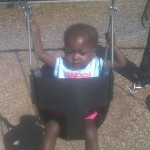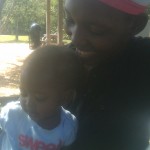A few months ago, our founder, Jamie McMutrie, sent me an email request that was uncharacteristically demanding: “I need to talk to you. Now.”
Jamie rarely makes demands, and when she does, she often prefaces them by saying: “I don’t mean to be a pain, but . . .” She’s strong for a variety of reasons, but mostly because she gives a lot of herself and asks so little of us.
So when she asked me to do something—now—I knew well enough to listen. And what I heard was a story, new to HFF, about a 17-month old girl, Ylionise, with a congenital heart condition called VSD that would, in her case, prove deadly. She needed a surgery she couldn’t get in Haiti, which meant she needed a medical visa to leave the country as well as a doctor and a hospital elsewhere willing to donate their services. Jamie had heard from a staff member of a hospital she regularly visits that Ylionise’s mother, Gertha, and her father, Ylionel, already spent their meager savings getting their daughter medical tests. After months of watching their daughter get sicker and sicker, they were getting desperate. The only help that had been offered to them involved relinquishing Ylionise to an orphanage that, after the surgery, would place her for adoption outside of Haiti.
 We wanted to give Ylionise and her family another option. But Jamie and our staff in Haiti knew little about how to obtain a medical visa, and none of us knew to whom we might turn for help with getting the medical staff and resources we would need. We did know that, as a young organization, we couldn’t afford to provide much financial assistance. “Do you think we could do this?” Jamie and I asked one another. That question implied another, more daunting one we didn’t ask out loud: what if we can’t?
We wanted to give Ylionise and her family another option. But Jamie and our staff in Haiti knew little about how to obtain a medical visa, and none of us knew to whom we might turn for help with getting the medical staff and resources we would need. We did know that, as a young organization, we couldn’t afford to provide much financial assistance. “Do you think we could do this?” Jamie and I asked one another. That question implied another, more daunting one we didn’t ask out loud: what if we can’t?
But, as it turned out, we could, with a lot of help. One of our board members, Lynn Lebowitz, contacted a friend who’s involved with Patrons of the HeARTs, a Florida-based organization that evaluates and treats children like Ylionise with congenital heart defects. Patrons found an incredibly generous sponsor, K. Fehling & Associates, to fund Ylionise’s medical costs. They also connected us to a Jacksonville-area family, the Gabets, who opened their home and their hearts to Ylionise and Gertha while they are in the United States. In Pittsburgh, Team Tassy helped with the visa process. Haitians, most especially Claude Raymond, Director of Immigration, were as eager as Americans to help the family, and together with U.S. embassy officials, they made it possible for mother and daughter to travel to the U.S.
 Most of all, it was Gertha’s and Ylionel’s devotion to their daughter, their determination to give her a chance to live, that made what seemed impossible a reality. Ylionise had surgery a few weeks ago and is recovering marvelously. She and her mother are almost ready to go home to Ylionel and Ylionise’s sister, Seralda, in Haiti. Someone asked, “what if,” and a lot of people came together to answer. And a child’s life is saved. And a family stays a family.
Most of all, it was Gertha’s and Ylionel’s devotion to their daughter, their determination to give her a chance to live, that made what seemed impossible a reality. Ylionise had surgery a few weeks ago and is recovering marvelously. She and her mother are almost ready to go home to Ylionel and Ylionise’s sister, Seralda, in Haiti. Someone asked, “what if,” and a lot of people came together to answer. And a child’s life is saved. And a family stays a family.
Shortly after we started working on Ylionise’s case, Partners in Health and a pediatrician in Haiti told us about another child, Junior, who, like Ylionise, needs help. Junior is a 12-year old boy who needs heart surgery for a condition he contracted by a fever when he was two. He will die soon, we have been told, if he does not get the kind of help Ylionise received. Generous as a child, Junior has told Jamie that he is glad such a small girl as Ylionise will no longer have to face death from a heart condition, as he does. He celebrates Ylionise’s new lease on life, and might be happy with his own fate knowing that she will survive. We would not be.
We don’t know how we can help Junior. But we know what will happen if we don’t.
–Jean Griffith, Executive Director
Today is the last day of our January social-media campaign to spread the word about how Haitian Families First works to preserve struggling families in Haiti. We are a small organization with a handful of staff members—the majority of whom are volunteers—and a shoestring budget. Still, as I look back over the past three weeks’ worth of blog posts, I’m struck by how many people from all walks of life the work of Jamie and Ali McMutrie has brought together.
There are, for example, HFF’s employees, volunteers, and colleagues in Haiti with whom HFF partners. There’s Junia, HFF staff person extraordinaire, whose efforts to help other families, let alone her efforts to help herself, her birth children, and her soon-to-be adopted child, are nothing short of heroic. And there’s Sherry, who has been brave enough to let a painful past inspire her to help others get involved in HFF’s work. Board member and “professional volunteer” Vivian Croft has described how touched she was to visit Jamie and Ali in Haiti, even though she has traveled widely and been involved with many other volunteer organizations. Another volunteer, Ross, also describes a visit to Haiti, where he learned some valuable lessons about HFF’s work (not to mention the value of a good set of tires).
We’ve seen how people from around the U.S. have been inspired by Jamie and Ali’s dedication to the children of Haiti. We’ve witnessed the enormous outpouring of love and respect adoptive parents from all over the world feel for the McMutrie sisters and the appreciation they have for the care Jamie and Ali gave their children.
And we have seen glimpses of the insides of a Haitian hospital’s maternity and pediatric wards, where directors, doctors, and nurses work with HFF staff to care for children and bring hope to families.
What we also see in those videos, of course, are glimpses of the faces of those we work for: a single father struggling to feed his infant son even as he mourns the loss of his wife; a little boy lovingly receiving medical treatment; a mother and a family receiving a few seeds and a new chance for a better life.
I am deeply humbled by these stories, by how many difference lives, world views, and circumstances they encompass, by the sheer amount of miles that separate them. And I am in awe at what brings them together.
There is one story—just one—that made all of these others possible. Over a decade ago, a very young woman in her early twenties got on a plane bound for Port-au-Prince. She had no solid plans for herself once she arrived, didn’t know how long she’d stay, and did not really know what she’d find once she got there. She had little money and fewer connections. All she really had was a love of children, a hatred of poverty, and a vision of a better world.
Except for the occasional visit to her family, she’s never left. Jamie has learned a great deal since then, of course, as has her sister, Ali. They have endured hurricanes and an earthquake as well as the pain of having to watch many children suffer and many families be torn apart. But a few things have not changed. They still work tirelessly and mostly thanklessly. They are just as dedicated to Haiti’s children and to a vision of a better world as they were over a decade ago.
And, although Jamie won’t like me telling you this because she’s still too unpretentious to take a complement, we continue to be inspired by them.
–Jean Griffith, Executive Director, Haitian Families First
Today’s post was written by HFF volunteer Sherry Cluver, who gives some great advice about how ordinary people can take small actions that can make a big difference to families in Haiti.
Believe in the work of Haitian Families First and yearn to help, but aren’t sure what li’l ol’ folks like you and I can do? That was exactly my question when I was given the reassuring answer–“Any little thing will help!”
So, that’s precisely where we began–with a small idea from my husband Chad, a high-school coach, to dub an upcoming home basketball game “Hoops for Haiti” night. After checking for approval from our building principal and the head coach of the team we would play, T-shirts were ordered and public service announcements written. Then, friends decided a banner would lend legitimacy to the atmosphere, and they covered the cost and delivery. Another friend, who works in the non-profit world, disseminated a press release, and two different papers and a pair of radio stations came calling.
That was it.
Net profit from T-shirt sales totaled a surprising $1,200, and an additional $800 was given in unsolicited donations–several of which were $100 or more each. Providing an outlet for people’s desire to help is all we did, and the community stepped forward with a deep interest and generous hearts.
 Having done one fundraiser, we could easily decide that our work is done, at least for now. But support and enthusiasm from our community keep coming in beautifully unexpected ways. Two days after mailing off the proceeds from “Hoops for Haiti,” a former student approached me with a $70 donation.
Having done one fundraiser, we could easily decide that our work is done, at least for now. But support and enthusiasm from our community keep coming in beautifully unexpected ways. Two days after mailing off the proceeds from “Hoops for Haiti,” a former student approached me with a $70 donation.
So, because of the palpable enthusiasm of our local community surrounding this cause, as well as the hunger Chad and I have for healing from our unusual adoption journey, we are forging ahead with our work. My friends suggested that I form a local fundraising committee, and all dozen women of different personalities and talents whom I invited to join replied with warmth and energy. So onward we go to approaching civic organizations and large corporations, sending out small business mailings, and conducting follow-up radio interviews and newspaper stories.
To get you started on your own “any little thing,” perhaps consider selecting a comfortable task or two from the list below. If you wish to contact me, I’ll gladly share with you tips I’ve learned and samples we’ve created along our grassroots journey.
Family preservation makes good, plain sense to people, and it’s easy to support an organization that operates without overhead–frugal, smart, and dignified. It takes only small steps to get that sort of word to spread and the inspiration to catch on.
Sherry Cluver, proud supporter of Haitian Families First
